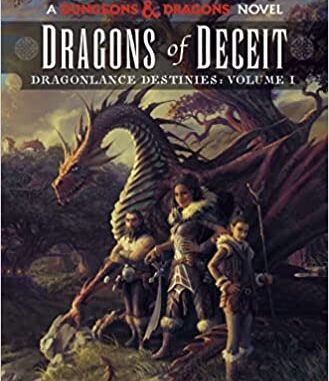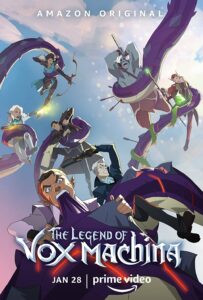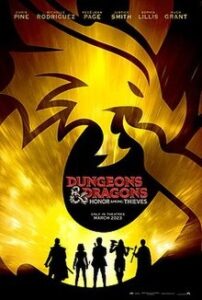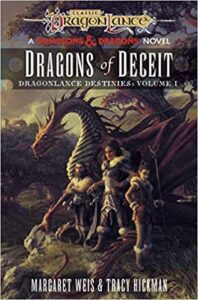
In the first two parts of this three-part series, I discussed the reasons to consider a line of fiction, including fan support. In the second part, I talked about the cost of supporting the line. In the final installment, it’s time to talk about why a publisher would go into debt to make this happen.
WHY SHOULD A PUBLISHER GO INTO DEBT?
 There’s a cost to make a book, a substantial monetary cost for some publishers. Considering the cost, what can a publisher expect in return? Obviously, the primary is short-term returns on their investment. No one wants to lose money. Putting $25,000 into a book needs to result in over $30,000 in returns so there is fiscal growth. But there are other reasons to create material. Getting to work with other creators is important for certain games. There’s always the possibility that you’ll hire the next R. A. Salvatore and forever have his work tied to your brand. Developing a project between RPGs or RPG supplements, filling a production gap, or making use of a different skill set, all of those offer dividends. Not only are you crafting another project, you’re getting the word out about what you do. This column, the larger series, it’s meant to delve into products that fans want but aren’t being produced right now. Part of that fanbase is the non-gamer fanbase. Those people that like RPGs, but not playing them. They include lapsed gamers, individuals that like the look of the products and contents, and fans of the related media like video games, Twitch streams, animated works, or even comics. Fans that are outside of the mainstream of tabletop gaming, but still willing to buy related products. A line of fiction could tap into that market and pull in non-standard customers.
There’s a cost to make a book, a substantial monetary cost for some publishers. Considering the cost, what can a publisher expect in return? Obviously, the primary is short-term returns on their investment. No one wants to lose money. Putting $25,000 into a book needs to result in over $30,000 in returns so there is fiscal growth. But there are other reasons to create material. Getting to work with other creators is important for certain games. There’s always the possibility that you’ll hire the next R. A. Salvatore and forever have his work tied to your brand. Developing a project between RPGs or RPG supplements, filling a production gap, or making use of a different skill set, all of those offer dividends. Not only are you crafting another project, you’re getting the word out about what you do. This column, the larger series, it’s meant to delve into products that fans want but aren’t being produced right now. Part of that fanbase is the non-gamer fanbase. Those people that like RPGs, but not playing them. They include lapsed gamers, individuals that like the look of the products and contents, and fans of the related media like video games, Twitch streams, animated works, or even comics. Fans that are outside of the mainstream of tabletop gaming, but still willing to buy related products. A line of fiction could tap into that market and pull in non-standard customers.
Beyond that, if you’re a publisher, what might drive you to fund and create an original fiction novel or even a line? What would convince you to hire an author to produce 100,000 to 150,000 words at a cost of $8,000 to $12,000 or more, then add on editing and the cover illustration before getting into marketing and printing? Beyond working with other creators or exposure to another market, what might drive you?
HOLLYWOOD AND VIDEO GAMES
 Cyberpunk 2077: the video game, the anime, the artbook, and the action figures, the financial backing that led to Cyberpunk Red from R. Talsorian Games. Cyberpunk 2077 wasn’t the hoped-for success in terms of quality at launch (though it has improved significantly), but it still spawned quite a bit of brand awareness. It drew attention to the original work and benefited Mike Pondsmith’s company.
Cyberpunk 2077: the video game, the anime, the artbook, and the action figures, the financial backing that led to Cyberpunk Red from R. Talsorian Games. Cyberpunk 2077 wasn’t the hoped-for success in terms of quality at launch (though it has improved significantly), but it still spawned quite a bit of brand awareness. It drew attention to the original work and benefited Mike Pondsmith’s company.
Up next is the Dungeons & Dragons movie, Honor Among Thieves (D&D: HAT). Will it be a hit? Maybe. Will it help the D&D brand? I think yes. D&D has many video games and their quality has no impact on Fifth Edition. But their presence increases brand awareness. The trailer for D&D: HAT looks like it’ll be a gateway for many non-gamers to enjoy D&D. For the purposes of this article, I’m hoping for a movie novelization tie-in.
The Legend of Vox Machina, while not truly a direct RPG media tie-in, the series still proved that there is an appetite for these products with its comics, action figures, and more. The brand as a whole touches on more than gamers.
Pathfinder has a variety of video games. Free League Publishing’s Mutant Year Zero: Road to Eden video game. Chaosium has a video games series contract. White Wolf has licensed the World of Darkness for mass media. Onyx Path Publishing’s Scion has been licensed for a TV deal.
 Since all of the “name” RPGs are gobbled up, we can infer interest from the entertainment industries to tap into the potential of RPGs. If one of these projects lands and generates big bucks and develops a fanbase of its own, then the other intellectual properties (IPs) like Shadowrun, Traveller, Twilight: 2000, Monster of the Week, 13th Age, and any other that may not already be licensed are going to get offers. Some of these, like Shadowrun, have crossed media before, others will have their first opportunity.
Since all of the “name” RPGs are gobbled up, we can infer interest from the entertainment industries to tap into the potential of RPGs. If one of these projects lands and generates big bucks and develops a fanbase of its own, then the other intellectual properties (IPs) like Shadowrun, Traveller, Twilight: 2000, Monster of the Week, 13th Age, and any other that may not already be licensed are going to get offers. Some of these, like Shadowrun, have crossed media before, others will have their first opportunity.
If any of them hits, then RPGs being bought up to make into movies and TV series is going to be a regular occurrence. But, to sweeten the deal, there is something some publishers could offer to draw suitors in and that’s fiction. Tie-in fiction helps to illustrate the project for companies and creators that don’t want to read gaming rulebooks then imagine what they’d have to do. As mentioned, Onyx Path licensed Scion, that includes their Scion: Tales of Heroes – A Scion Anthology. Did that book seal the deal? I do not know, but it didn’t hurt. It gave the pitch package some prose to go with the gaming instructions and many illustrations, something that is easier for executives to digest.
When it comes time for other properties to consider the pros and cons of Hollywood and the video game industry, fiction may be an advantage. Concepts like (and I am picking at random, this is not to imply that they are planning to make this move) Coyote & Crow are easy to grasp, but the stories themselves may elude certain audiences. A novel may solidify the world and concepts into a coherent narrative for those folks with the checkbooks. Blades in the Dark might transition to another media, but prose would help smooth the transition.
SHOULD THEY WRITE?
 The odds of turning a massive profit on prose are thinner than creating an RPG. However, there is a chance for profit and a chance to better illustrate the property for other audiences, both fans and licensees. Is prose likely to drive Hollywood deals? Probably not, but it’s likely to overcome that person in the room that doesn’t get the existing material is a launching pad for stories within a world. If the IP is strong enough, prose will get it in front of other potential fans and can only lead to a larger, better informed community. Is it worth the risk? If you’re taking your property to the next level, it is worth the risk to the publisher.
The odds of turning a massive profit on prose are thinner than creating an RPG. However, there is a chance for profit and a chance to better illustrate the property for other audiences, both fans and licensees. Is prose likely to drive Hollywood deals? Probably not, but it’s likely to overcome that person in the room that doesn’t get the existing material is a launching pad for stories within a world. If the IP is strong enough, prose will get it in front of other potential fans and can only lead to a larger, better informed community. Is it worth the risk? If you’re taking your property to the next level, it is worth the risk to the publisher.
If RPG fiction comes back, who would you like to see writing it? What stories would you like to see told?
I wrote a few paragraphs for one of the Rex Draconis RPG books. Egg Embry participates in the OneBookShelf Affiliate Program, Noble Knight Games’ Affiliate Program, and is an Amazon Associate. These programs provide advertising fees by linking to DriveThruRPG, Noble Knight Games, and Amazon. Check out my latest free roleplaying pamphlet, HUMAN… ALMOST, a post-cyberpunk police procedural (DriveThruRPG and Itch.io).
Latest posts by Egg Embry (see all)
- New Gamemaster Month 2023 - January 20, 2023
